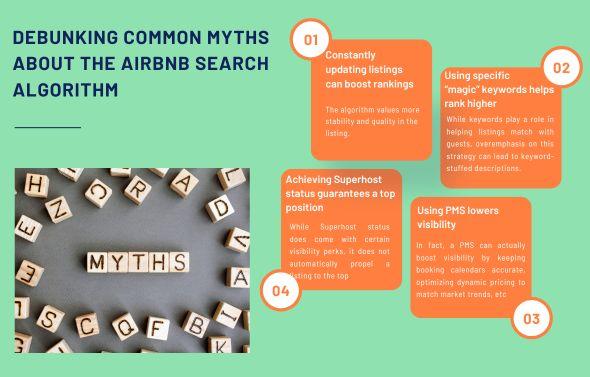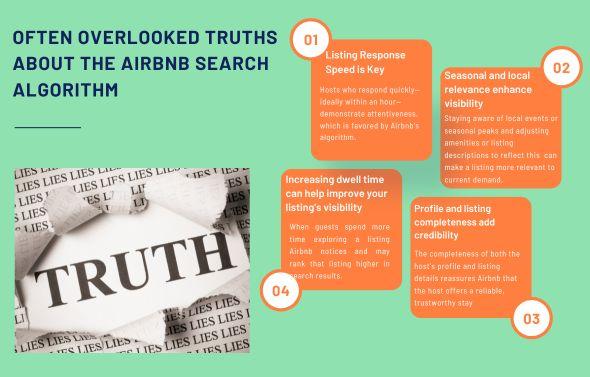Debunking Airbnb's Search Algorithm: Separating Facts from Fiction

Imagine spending hours perfecting your Airbnb listing — captivating photos, detailed descriptions, competitive pricing — only to find it buried on page five of search results. For Airbnb hosts, cracking the code of the platform’s search algorithm can feel like an endless guessing game.
Many hosts grapple with myths about the platform’s algorithm — like constantly updating listings or slashing prices — hoping for quick results. In reality, Airbnb’s search rankings rely on specific, often misunderstood factors.
In this article, we’ll separate fact from fiction, breaking down the truths and myths about Airbnb’s search algorithm.
Common Myths about the Airbnb Search Algorithm

1. Constantly updating listings can boost rankings
It’s a common belief among Airbnb hosts that frequently tweaking or updating their listings will boost their position in search results. This myth has likely spread from the idea that any kind of engagement or activity on a listing will be seen positively by the algorithm.
Hosts may feel pressured to change descriptions, update photos or tweak the listing title, hoping these updates will improve visibility. However, in reality, the algorithm is not designed to reward random updates.
While it’s true that maintaining an active, accurate and appealing listing is essential, frequent, unnecessary changes can actually disrupt the listing’s performance. Instead of improving ranking, constant updates can confuse potential guests, especially if details change often.
What the algorithm values more is stability and quality in the listing. Regular, thoughtful updates that genuinely enhance the guest experience — such as adding new amenities or updating photos after a property improvement — can positively impact performance, but unnecessary tweaks simply for the sake of activity are unlikely to help and could even backfire.
To quote Airbnb, "If you're not making any qualitative changes to your listing, there's really no algorithm benefit. But if you're adding seasonal pictures, updating your amenities or have a true update to add to the property, those are things that can absolutely influence your performance in the algorithm."
2. Using specific “magic” keywords guarantees better placement.
Another prevalent myth is that inserting certain “magic” keywords will unlock a higher ranking. Some hosts believe that by loading their listing titles, descriptions and amenities with trendy or popular search terms, they can manipulate the algorithm to gain a visibility advantage.
While keywords certainly play a role in helping guests find what they’re looking for, overemphasis on this strategy can lead to keyword-stuffed descriptions that don’t actually resonate with potential guests.
Airbnb’s algorithm considers keywords, but only as one part of a complex assessment of listing quality and relevance. Excessive keyword use can make a listing appear less authentic and harder for guests to read, ultimately discouraging bookings.
Instead of focusing on “magic” keywords, hosts should aim for clear, natural descriptions that reflect what their listing truly offers. Prioritize genuine highlights, like “cozy mountain view cabin with hot tub” or “modern downtown loft near attractions.”
Descriptive and precise language appeals more to guests and naturally aligns with the algorithm’s intent to match guests with listings that meet their criteria.
3. Achieving Superhost status guarantees a top position in search results.
Superhost status is a badge of honor on Airbnb, earned through consistent, high-quality hosting. Many hosts work hard to achieve this designation, assuming it will guarantee top rankings in search results.
While Superhost status does come with certain visibility perks, it does not automatically propel a listing to the top. Airbnb’s algorithm considers many factors, such as listing quality, guest reviews and booking history, which means even non-Superhost listings with strong metrics can rank highly.
Superhost status signals reliability and can make a listing more attractive to potential guests, potentially leading to more bookings. However, it’s only one piece of the puzzle.
A Superhost badge won’t compensate for low-quality photos, poorly maintained amenities or weak guest communication. Listings that consistently perform well in all key areas are likely to do well in search results, whether or not the host has achieved Superhost status.
For hosts, the focus should be on providing an excellent experience across the board, as this will naturally improve ranking while increasing the likelihood of earning or maintaining Superhost status.
4. Using property management systems (PMS) lowers visibility
Many hosts worry that using a property management system (PMS) might hurt their visibility on Airbnb, assuming the algorithm favors manually managed listings. However, Airbnb’s algorithm values quality, accuracy and responsiveness — whether or not a PMS (or vacation rental channel manager), is involved.
In fact, a PMS can actually boost visibility by keeping booking calendars accurate, optimizing dynamic pricing to match market trends and ensuring timely, reliable guest communication.
These tools help hosts avoid double bookings, manage seasonal rates and maintain high response rates, all of which align with what the algorithm prioritizes for a positive guest experience.
Rather than reducing personal connection, a well-used PMS streamlines operations so hosts can focus on delivering a high-quality stay, ultimately enhancing both guest satisfaction and search ranking.
Often Overlooked Truths About the Airbnb Search Algorithm

1. Listing response speed is key
The speed at which hosts respond to inquiries and booking requests has a significant effect on a listing’s ranking. While maintaining a high response rate is commonly emphasized, the time it takes to send an initial reply is often overlooked.
Hosts who respond quickly — ideally within an hour — demonstrate attentiveness, which is favored by Airbnb’s algorithm. Setting up automated welcome messages or responses to common questions can help hosts maintain a high response speed, particularly during busy periods.
2. Seasonal and local relevance enhance visibility
The Airbnb algorithm also considers the relevance of a listing to seasonal or local demand. For example, listings in popular beach destinations may see higher visibility in summer, while mountain cabins might rise in winter searches.
Staying aware of local events or seasonal peaks and adjusting amenities or listing descriptions to reflect this (e.g., “close to ski slopes” or “perfect for summer beach vacations”) can make a listing more relevant to current demand, boosting its ranking during peak times. Make sure to replace any seasonal references with other keywords when the reference is no longer relevant.
3. Profile and listing completeness add credibility
The completeness of both the host’s profile and listing details is a subtle but impactful factor. A fully completed listing, with detailed descriptions, high-quality photos and accurate amenity lists, tells Airbnb that the host is committed to providing a transparent, high-quality experience.
Similarly, a well-rounded host profile that includes a photo, bio and verifications can build trust with both the platform and potential guests. This attention to detail can enhance a listing's ranking, as it reassures Airbnb that the host offers a reliable, trustworthy stay.
4. Increasing dwell time can help improve your listing’s visibility
Dwell time or “time on page,” refers to how long potential guests spend viewing your listing. Why does this matter to Airbnb? They want guests to have memorable experiences that encourage repeat bookings.
When guests spend more time exploring a listing — reading through details, scanning reviews and checking out nearby attractions — Airbnb notices and may rank that listing higher in search results.
Pro tip: To boost dwell time, focus on engaging, high-quality photos. Consider twilight shots taken just before sunset, which create an inviting, atmospheric feel. Striking photos encourage potential guests to linger on your listing, envisioning their stay before they even book.
Embrace What Works and Dispel the Myths
Mastering Airbnb’s search algorithm is less about shortcuts and more about delivering quality. By shedding common myths and focusing on genuine improvements — like engaging descriptions, accurate calendars and positive guest experiences — hosts can build sustainable success.
Remember, Airbnb’s algorithm rewards reliability and guest satisfaction, so prioritize these elements to see lasting results and a steady flow of bookings.
Ready to find out how Hostaway can transform your business?
